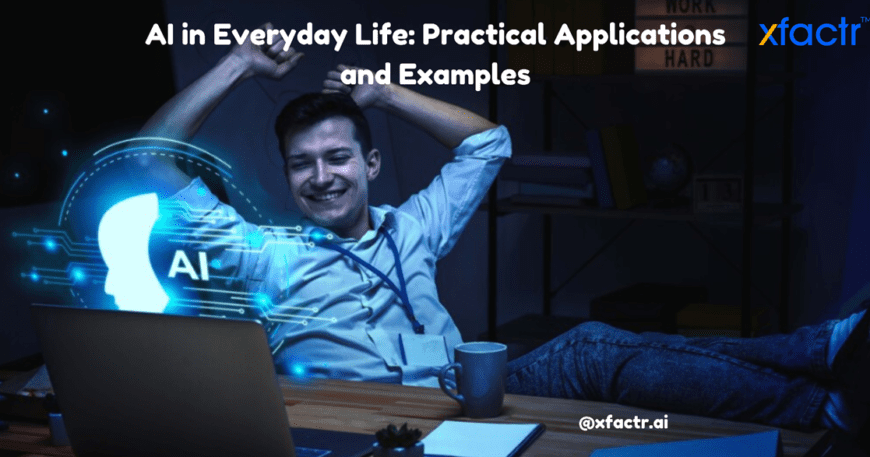Introduction:
Artificial Intelligence (AI) is no longer a concept of the distant future—it’s here and it’s transforming our daily lives in remarkable ways. From the moment we wake up to the time we go to bed, AI is working behind the scenes to make our lives more convenient, efficient, and personalized. Let’s delve into some practical applications and examples of AI that we encounter every day.
- Smart Assistants: Your Personal AI Companions
Voice-activated smart assistants like Siri, Alexa, and Google Assistant have become integral parts of our daily routines. These AI-powered companions help us manage schedules, play music, control smart home devices, and even answer trivia questions. With natural language processing, they understand and respond to our commands, making life simpler and more streamlined.
Example: “Hey Siri, what’s my schedule for today?” Your AI assistant retrieves your calendar and provides a rundown of your appointments, ensuring you stay on top of your day.
- Personalized Recommendations: Tailored Experiences
AI algorithms power the personalized recommendations we receive on platforms like Netflix, Amazon, and Spotify. By analyzing our past behaviors and preferences, these systems suggest movies, products, and music that we’re likely to enjoy. This not only enhances our user experience but also helps us discover new content that aligns with our tastes.
Example: Netflix uses AI to recommend shows based on your viewing history, ensuring you always have something new and interesting to watch.
- E-commerce: Revolutionizing Shopping
AI is revolutionizing the e-commerce industry by providing personalized shopping experiences. From chatbots that assist with customer inquiries to recommendation engines that suggest products based on your browsing history, AI makes online shopping more intuitive and enjoyable. Additionally, AI helps in managing inventory, predicting sales trends, and optimizing supply chains.
Example: Amazon’s recommendation engine suggests products that complement your recent purchases, making it easier to find what you need.
- Navigation and Travel: Smarter Journeys
Navigation apps like Google Maps and Waze utilize AI to provide real-time traffic updates, optimize routes, and predict travel times. By analyzing data from various sources, these apps ensure that we reach our destinations quickly and safely. AI is also used in ride-sharing apps like Uber and Lyft to match drivers with passengers efficiently.
Example: Google Maps uses AI to suggest the fastest route based on current traffic conditions, helping you avoid delays and reach your destination on time.
- Healthcare: Transforming Patient Care
AI is making significant strides in healthcare, from diagnosing diseases to personalizing treatment plans. Machine learning algorithms analyze medical data to predict patient outcomes, while AI-powered tools assist doctors in making more accurate diagnoses. AI also plays a role in managing healthcare records and optimizing hospital operations.
Example: AI algorithms can analyze medical images to detect early signs of diseases like cancer, leading to timely and potentially life-saving interventions.
- Customer Service: Enhanced Support
AI-driven chatbots and virtual assistants provide round-the-clock customer support, handling inquiries, resolving issues, and guiding customers through various processes. This not only improves customer satisfaction but also frees up human agents to focus on more complex tasks.
Example: A chatbot on a retail website can help customers track orders, initiate returns, and answer product-related questions, providing instant support without the need for human intervention.
- Photography and Social Media: Creative Enhancements
AI enhances our photos and videos with features like facial recognition, auto-tagging, and smart filters. Social media platforms use AI to curate content, suggest friends, and even detect inappropriate content, ensuring a safer and more engaging user experience.
Example: Facebook uses AI to recognize faces in photos, making it easy to tag friends and share memories.
- Energy Efficiency: Smart Home Solutions
AI-powered smart thermostats and home energy management systems learn our preferences and habits, optimizing energy usage to reduce costs and environmental impact. These systems can adjust heating, cooling, and lighting automatically, ensuring comfort and efficiency.
Example: A smart thermostat like Nest learns your schedule and adjusts the temperature accordingly, saving energy when you’re not home and ensuring comfort when you return.
AI is seamlessly integrating into various aspects of our daily lives, making tasks easier, enhancing experiences, and providing innovative solutions to everyday challenges. As AI technology continues to advance, we can expect even more exciting and beneficial applications in the future. Embrace the AI revolution and explore how it can enhance your life today!


